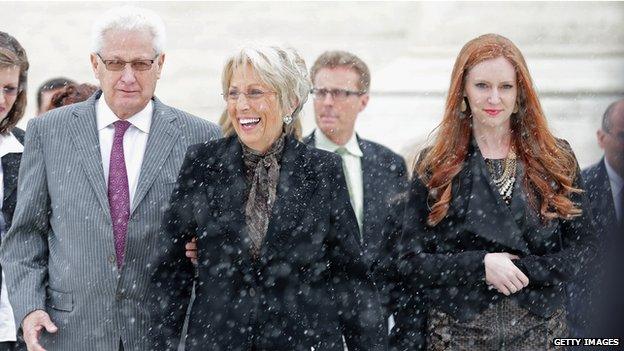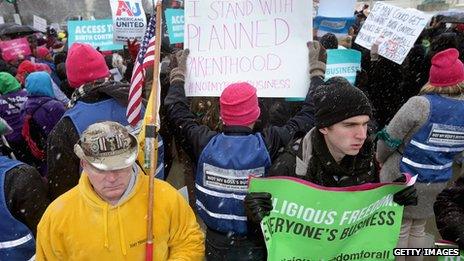Hobby Lobby case: Court weighs birth control mandate
- Published
- comments

Hobby Lobby co-founders David Green (left) and Barbara Green (centre) say their religion bars them from offering contraception coverage to their workers in their employee health plan
The US Supreme Court has heard arguments in a case that turns on whether for-profit companies can exercise religious beliefs.
Two companies are challenging a provision of a 2010 healthcare overhaul that requires employers to cover the cost of workers' birth control.
Their owners say that violates their Christian beliefs. The government says an exemption would undermine the law.
A ruling in the closely watched case is expected in June.
The craft store Hobby Lobby and the cabinetmaker Conestoga Wood Specialties Corp are challenging the measure in the 2010 Affordable Care Act (ACA), President Barack Obama's signature healthcare overhaul, which is known to its detractors as "Obamacare".
The companies are owned by people who say their religious faith puts them in opposition to four methods of contraception included as preventative care in the law. The law requires them to offer birth control coverage in their company health insurance plans or pay a tax.
The companies are suing the federal department of Health and Human Services, which oversees the implementation of the healthcare law.
Exercising beliefs
The arguments on Tuesday were something of a re-match for US Solicitor General Donald Verrilli, representing the Obama administration in defence of the law, and lawyer Paul Clement, who represented the companies.
The men faced off in front of the Supreme Court in 2012 to argue the legality of the ACA, which sought to vastly increase the number of Americans covered by health insurance and to regulate the quality of insurance they received.
The law passed without a single vote from Republican lawmakers. It has been a divisive topic in Washington ever since.
Though the court upheld the law's overall constitutionality in 2012, individual sections of the ACA have been under attack from both Republicans in Congress and some in the private sector.
In this particular challenge, Hobby Lobby and Conestoga argue the contraception mandate creates an undue burden on the religious beliefs of a corporation. But neither Congress nor US courts have ever established clearly that corporations can have religious beliefs in the first place.
In oral arguments on Tuesday, the nine-member court's more liberal judges worried about the precedent it would set should this case do just that.
"There are quite a number of medical treatments that different religious groups object to," said Justice Elena Kagan, who was appointed by Mr Obama.
"So one religious group could opt out of this and another religious group could opt out of that and everything would be piecemeal and nothing would be uniform."
Justice Sonia Sotomayor, also an Obama appointee, noted that blood transfusions, vaccines and medical procedures using pig tissue could all be opposed on religious grounds.
But to deny that companies could not take religious objections to government regulations would cause other problems, said conservative Justice Samuel Alito, who was appointed by President George W Bush.
"What about the implications of saying that no for-profit corporation can raise any sort of free exercise claim at all and nobody associated with the for-profit corporation can raise any sort of free exercise claim at all?"
He cited a recent ruling in Denmark that required all animals to be stunned before slaughter, effectively banning kosher and halal meat preparations.

Supporters of both sides of the argument demonstrated outside of the court
"Suppose Congress enacted something like that here. What would a corporation that is a kosher or halal slaughterhouse do?" he asked.
"They would have no recourse whatsoever. They couldn't even get a day in court."
Much will depend on how the justices interpret the 1993 Religious Freedom Restoration Act (RFRA), which made it easier for individuals and groups to apply for religious exemptions from laws.
It was passed in response to a Supreme Court ruling against two drug counsellors who lost their jobs after using peyote, an illegal drug, in a Native American religious ritual.
On Tuesday, Mr Verrilli argued that the RFRA was meant to protect individuals, not to hold employees hostage to their employers' religious beliefs.
He said that allowing companies to opt out of federal laws on religious grounds would enable them to cite their faith to oppose civil rights, disability access, or other civil protections ensured by the government - especially as it is impractical to debate the sincerity of any religious belief.
But Mr Clement argued that Congress intended for the law to be expansive.
'Too much government'
He noted that churches and non-profits were already exempt from the contraception mandate and asked why for-profit companies could not be extended the same protection.
Outside the court, protesters on both sides held placards and chanted as snow fell around them. The contraception mandate's supporters greatly outnumbered Hobby Lobby's supporters.
"Employees have an obligation to provide basic healthcare services and can't pick and choose what those services are," said Beth Parker, general counsel for Planned Parenthood of California, a women's health organisation.
But Hadley Heath, health policy director of the conservative Independent Women's Foundation, said women employees could purchase contraception on their own and companies should be free to choose not to offer it.
"These cases illustrate the inevitable conflicts that result from too much government involvement in healthcare," she said in a statement.
- Published25 March 2014